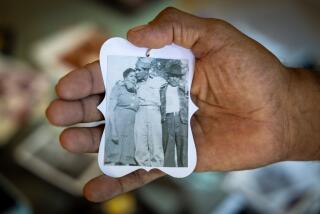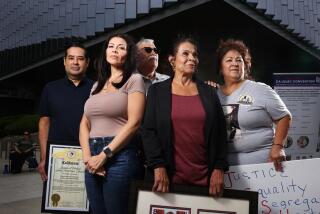KPBS DELVES INTO SEGREGATION TRIAL
SAN DIEGO — In 1931, Mexican-American children were suddenly barred from attending the Lemon Grove Grammar School.
Robert Alvarez was a fifth-grader that year. While their Anglo classmates looked on that morning, the Latino kids were shunted to a new building, known as the barn. There they were to be taught separately from their Anglo classmates.
The Latino parents didn’t buy the idea at all. Many of them, such as Alvarez’s, forbade their children to attend class that day to prevent a confrontation. Ultimately, the Latino parents formed the Neighborhood Assn. of Lemon Grove and filed a suit, in Alvarez’s name, against the school board. They won the suit, which became the first successful desegregation case in the country, 33 years before the landmark Brown vs. the Board of Education case in 1954.
“The Lemon Grove Incident,” an excellent docudrama about the event, will premiere at 9 o’clock tonight on KPBS (Channel 15). Written by producer Paul Espinoza and directed by Frank Christopher (“In the Name of the People”), the locally produced one-hour show captures the struggle of a community that united to defeat an unjust decision forced on them by the school board.
Espinoza is director of Latino programs produced by KPBS, including such documentaries as “Ballad of an Unsung Hero,” about Pedro J. Gonzalez, a singer-songwriter who was the first Spanish-language radio broadcaster in Southern California and a tireless civil rights advocate. He also produced and co-wrote “Aguas Negras: Black Water Time Bomb,” about the flow of Tijuana sewage into the United States, and “The Trail North,” about a Latino father and son retracing their family’s journey from Mexico to California.
“The Lemon Grove Incident” is the most ambitious project to date for KPBS, its first hourlong program that makes extensive use of dramatization. Espinoza drew heavily on local acting talent in casting the 25 speaking roles and about 40 non-speaking parts in the film, which blends documentary footage with dramatizations. “We relied almost completely on San Diego actors, most of whom had little film experience,” he said.
Several key scenes are dramatized. Local actor Bill Brinsfield gives a fine performance as school board member Andy Anderson. Dramatic scenes include a meeting of the three-member Lemon Grove school board, at which a proposal by the PTA to segregate the school is adopted; class scenes before the segregation ruling goes into effect; the trial, and a meeting in which the Latino parents struggle to reach a consensus on how to respond to the pending school segregation.
A particularly melodramatic scene involves actor Bill Davis (who recently played Ronald Reagan in “Rap Master Ronnie” at the San Diego Repertory Theatre) as a truant officer and Luisa Vargas as Guadalupe Ruiz. In the scene, Ruiz is shown telling the truant officer--with her son acting as interpreter--that she is not about to send her children to the new Olive Street School. It is, she points out, illegal to deny them entry to the Lemon Grove Grammar School. A widow, Ruiz and her children were deported to Mexico under Herbert Hoover’s repatriation program when she refused to send them to the new school.
In 1930 it was legal in California to segregate Indians, blacks and Asians, but not Latinos. At the time, a bill that would have made it legal to segregate Latinos was before the Legislature. The outcome of the Lemon Grove case helped defeat the bill.
Historic film footage and interviews with former students who recollect the incident are intercut with the dramatization. Newspaper reports were helpful in tracking down the facts of the case, Espinoza said, but the most important source of information came from the federal archives in Mexico City.
The Mexican consul in San Diego took an active interest in the case, meeting with the Lemon Grove Latinos and filing numerous reports. The consul, like the parents, took strong exception to segregating the children, most of whom were born in California and spoke English. “Like most parents, the Mexican-Americans saw education as part of social mobility,” Espinoza said.
On the other side of the coin were some of the Anglo parents. Before 1930, the Latino children had not been an issue in the Lemon Grove school, but that year their numbers reached nearly 50% of the enrollment, and certain parents who were active in the PTA felt threatened, Espinoza said. The presence of the Latino children was causing overcrowding and unsanitary conditions, and was holding back the progress of their children, the parents alleged. In the film, the lawyer for Alvarez, who was retained by the Mexican consul, dismantles the school board’s reasons for the segregation step by step.
Before “The Lemon Grove Incident,” KPBS primarily had relied on the interview format for its documentaries and programs. To create this program, Espinoza sought major grants.
It took about two years to secure financing for the “The Lemon Grove Incident,” which is the first KPBS program funded by the Corporation for Public Broadcasting. CPB contributed $98,000 to the total production expenses of about $275,000.
The idea for the show came from Robert Alvarez’s son, an anthropologist, who also proposed the production of “The Trail North.” Robert Alvarez Jr. is the protagonist in “The Trail North,” in which he and his 10-year-old son trace their family’s path from Mexico to Lemon Grove.
Today, Robert Alvarez Sr. owns Coast Citrus Distributors, one of the largest Latino-owned businesses in the nation. He is 66. It has been more than 50 years since he took the stand. In 1931, he and the other Latinos did not parade their court victory. Alvarez still downplays the events of those two days in court.
“I think that, generally, the people of Lemon Grove were not in favor of (segregation). I thought it was an isolated action,” Alvarez said.
After attending Sherman Elementary in San Diego for a brief period, he returned to Lemon Grove Grammar School. “We didn’t have any problem with the teachers,” he said. “They didn’t discriminate against us. They taught us very well. We were kicked in the butt if we were bad, just as much as the other kids--no more and no less.
“I remember Mr. Green, the principal. He had this wooden paddle he used on us. So far as I know, he didn’t discriminate.”
“The Lemon Grove Incident” will be repeated on Channel 15 at 2 p.m. Thursday and at 1 p.m. Saturday.
More to Read
Sign up for Essential California
The most important California stories and recommendations in your inbox every morning.
You may occasionally receive promotional content from the Los Angeles Times.










